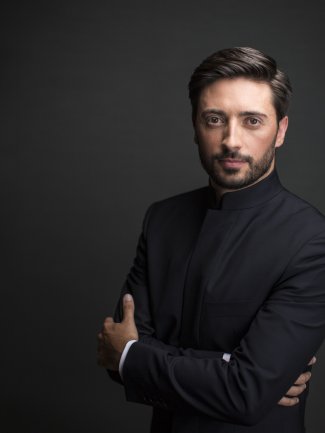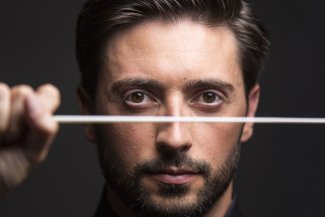


Antonio Méndez
Download Assets
“It is not difficult to guess that the Spanish conductor Antonio Méndez will have a remarkable career…”
(Rhein-Main-Zeitung)
Spanish conductor Antonio Méndez is fast becoming one of the most exciting, established and sought-after conductors, having created strong links with the most important orchestras in Europe.
Over the last few years, Antonio has had great success conducting orchestras such as Tonhalle-Orchester Zürich, Symphonieorchester des Bayerischen Rundfunks, Mahler Chamber Orchestra, Rotterdam Philharmonic Orchestra, Danish National Symphony Orchestra, hr-Sinfonieorchester, Wiener Symphoniker and Orchestre Philharmonique du Luxembourg.
This season, he will perform with the BBC Symphony Orchestra, San Diego Symphony Orchestra, Iceland Symphony Orchestra, Orchestra Ensemble Kanazawa, Gunma Symphony Orchestra, Orquesta Sinfónica del Principado de Asturias, Orquestra de les Illes Balears, and Orchester des Pfalztheaters Kaiserslautern among others.
In the past season, Antonio debuted with La Monnaie / De Munt, Brucknerhaus Linz, Lahti Symphony Orchestra, Northern Sinfonia, San Diego Symphony Orchestra, Real Orquesta Sinfónica de Sevilla and RST Symphony Orchestra among others. Highlights of recent seasons include acclaimed debuts with Wiener Symphoniker, Tonkünstler-Orchester Niederösterreich, Konzerthausorchester Berlin, Staatskapelle Dresden, Gürzenich-Orchester Köln, BBC Philharmonic, Orchestra de Chambre de Paris, Helsinki Philharmonic Orchestra, Iceland Symphony Orchestra, Orchestre de Chambre de Lausanne, Russian National Orchestra, KBS Symphony Orchestra, Auckland Philharmonia Orchestra, New Japan Philharmonic and a tour with Orchestre de Chambre de Paris to the Canary Islands.
See more
Also working in opera over recent seasons, Méndez has conducted The Turn of the Screw at La Monnaie / De Munt, Ariadne auf Naxos at the Canary Islands Music Festival, 7 Deaths of Maria Callas – a show that combines opera, live arts, performance art and video creation – at Gran Teatre del Liceu, Madame Butterfly at the Palma de Mallorca Opera House and L’Elisir d’Amore at the Tenerife Opera House. Antonio held the post of Principal Conductor of Orquesta Sinfónica de Tenerife from the 2018/19 to 2020/21 season.
Antonio’s recording with Radio-Sinfonieorchester Stuttgart des SWR on SWR Music (for Berlin Classics) was awarded an Echo Klassik Award. He has also recorded with Scottish Chamber Orchestra for Linn Records.
The artist attracted international attention as a prize winner at the prestigious 2012 Malko Competition in Copenhagen, and later as a finalist at the 2013 Nestlé and Salzburg Festival Young Conductors Award.
Born in 1984 in Palma de Mallorca, Antonio began his musical studies at the Conservatori Professional de Música de Mallorca in piano and violin. He also attended the Real Conservatorio Superior de Música de Madrid to study composition and conducting. Since 2007 he has been living in Germany, where he completed his conductor training at the Universität der Künste Berlin with Professor Lutz Köhler, also as a member of the Dirigentenforum (‘Conductor’s Forum’ from the German Music Council) and at the Hochschule für Musik ‘Franz Liszt’ Weimar with Professor Nicolás Pasquet.
Contacts
Federico Hernandez General Manager HarrisonParrott Madrid & Latin American Business
worldwide general management
Season Highlights
El Sistema
Show more about El Sistema
GUSTAV MAHLER: Symphony No. 6 in A minor, 'Tragic'
Méndez, with the BBCSO were at their best, impressed in the first two of Respighi’s Roman trilogy of symphonic poems, Fountains of Rome and Pines of Rome. These lavishly scored works are unique in succeeding almost exclusively by means of their picturesque colour. The orchestration is dazzling, both in the quiet and grand dramatic moments. Méndez let the music speak for itself, never pushing the tempi or exaggerating the climaxes. The poetic elements of the Fountains, with its echoes of Richard Strauss and Debussy, were beautifully crafted.
“Méndez’s interpretation was round, but at the same time well organised, with an extremely generous Orquestra Nacional in the tutti and orchestral climaxes.”
“Right from the beginning he underlined the vehement tutti sounds and the swirling string passages, but on the other side shaped softly and sensitively the vocal parts.”
“Méndez, a most animated conductor, drew a reading that blended supercharged thrills in the more bombastic, quasi-military episodes with their tumultuous brass fanfares with brooding introspection in the darker overtones of the opening movement and exquisite, romantic lyricism in the lovely Adagio third movement.”
“Antonio Méndez conducted Ravel’s two Suites, carefully crafting the colour nuances, balancing instruments in order to create this volatile atmosphere, but without giving into the temptation of focusing only on sound and neglecting the rhythm that is specific to this piece, originally conceived as a ballet.”









